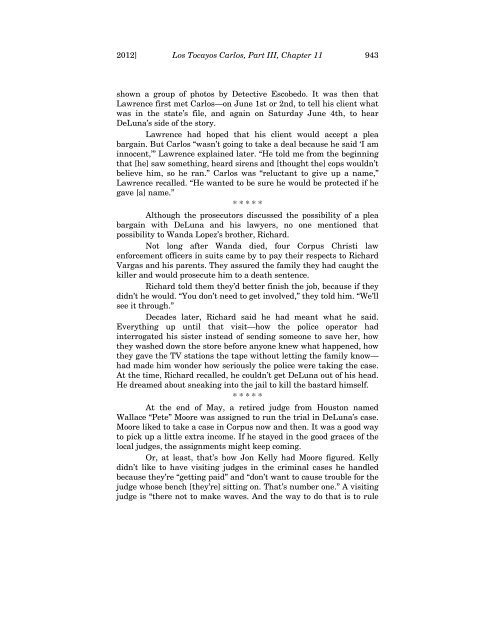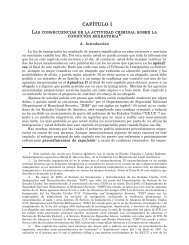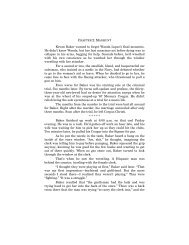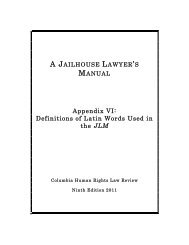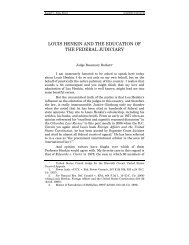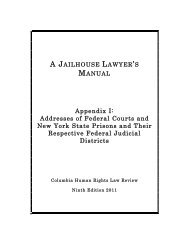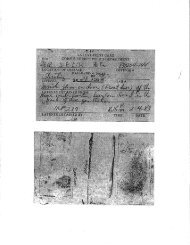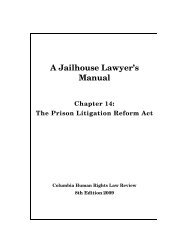Hector De Peña was the first lawyer assigned to defend Carlos ...
Hector De Peña was the first lawyer assigned to defend Carlos ...
Hector De Peña was the first lawyer assigned to defend Carlos ...
Create successful ePaper yourself
Turn your PDF publications into a flip-book with our unique Google optimized e-Paper software.
2012] Los Tocayos <strong>Carlos</strong>, Part III, Chapter 11 943<br />
shown a group of pho<strong>to</strong>s by <strong>De</strong>tective Escobedo. It <strong>was</strong> <strong>the</strong>n that<br />
Lawrence <strong>first</strong> met <strong>Carlos</strong>—on June 1st or 2nd, <strong>to</strong> tell his client what<br />
<strong>was</strong> in <strong>the</strong> state’s file, and again on Saturday June 4th, <strong>to</strong> hear<br />
<strong>De</strong>Luna’s side of <strong>the</strong> s<strong>to</strong>ry.<br />
Lawrence had hoped that his client would accept a plea<br />
bargain. But <strong>Carlos</strong> “<strong>was</strong>n’t going <strong>to</strong> take a deal because he said ‘I am<br />
innocent,’” Lawrence explained later. “He <strong>to</strong>ld me from <strong>the</strong> beginning<br />
that [he] saw something, heard sirens and [thought <strong>the</strong>] cops wouldn’t<br />
believe him, so he ran.” <strong>Carlos</strong> <strong>was</strong> “reluctant <strong>to</strong> give up a name,”<br />
Lawrence recalled. “He wanted <strong>to</strong> be sure he would be protected if he<br />
gave [a] name.”<br />
* * * * *<br />
Although <strong>the</strong> prosecu<strong>to</strong>rs discussed <strong>the</strong> possibility of a plea<br />
bargain with <strong>De</strong>Luna and his <strong>lawyer</strong>s, no one mentioned that<br />
possibility <strong>to</strong> Wanda Lopez’s bro<strong>the</strong>r, Richard.<br />
Not long after Wanda died, four Corpus Christi law<br />
enforcement officers in suits came by <strong>to</strong> pay <strong>the</strong>ir respects <strong>to</strong> Richard<br />
Vargas and his parents. They assured <strong>the</strong> family <strong>the</strong>y had caught <strong>the</strong><br />
killer and would prosecute him <strong>to</strong> a death sentence.<br />
Richard <strong>to</strong>ld <strong>the</strong>m <strong>the</strong>y’d better finish <strong>the</strong> job, because if <strong>the</strong>y<br />
didn’t he would. “You don’t need <strong>to</strong> get involved,” <strong>the</strong>y <strong>to</strong>ld him. “We’ll<br />
see it through.”<br />
<strong>De</strong>cades later, Richard said he had meant what he said.<br />
Everything up until that visit—how <strong>the</strong> police opera<strong>to</strong>r had<br />
interrogated his sister instead of sending someone <strong>to</strong> save her, how<br />
<strong>the</strong>y <strong>was</strong>hed down <strong>the</strong> s<strong>to</strong>re before anyone knew what happened, how<br />
<strong>the</strong>y gave <strong>the</strong> TV stations <strong>the</strong> tape without letting <strong>the</strong> family know—<br />
had made him wonder how seriously <strong>the</strong> police were taking <strong>the</strong> case.<br />
At <strong>the</strong> time, Richard recalled, he couldn’t get <strong>De</strong>Luna out of his head.<br />
He dreamed about sneaking in<strong>to</strong> <strong>the</strong> jail <strong>to</strong> kill <strong>the</strong> bastard himself.<br />
* * * * *<br />
At <strong>the</strong> end of May, a retired judge from Hous<strong>to</strong>n named<br />
Wallace “Pete” Moore <strong>was</strong> <strong>assigned</strong> <strong>to</strong> run <strong>the</strong> trial in <strong>De</strong>Luna’s case.<br />
Moore liked <strong>to</strong> take a case in Corpus now and <strong>the</strong>n. It <strong>was</strong> a good way<br />
<strong>to</strong> pick up a little extra income. If he stayed in <strong>the</strong> good graces of <strong>the</strong><br />
local judges, <strong>the</strong> assignments might keep coming.<br />
Or, at least, that’s how Jon Kelly had Moore figured. Kelly<br />
didn’t like <strong>to</strong> have visiting judges in <strong>the</strong> criminal cases he handled<br />
because <strong>the</strong>y’re “getting paid” and “don’t want <strong>to</strong> cause trouble for <strong>the</strong><br />
judge whose bench [<strong>the</strong>y’re] sitting on. That’s number one.” A visiting<br />
judge is “<strong>the</strong>re not <strong>to</strong> make waves. And <strong>the</strong> way <strong>to</strong> do that is <strong>to</strong> rule


